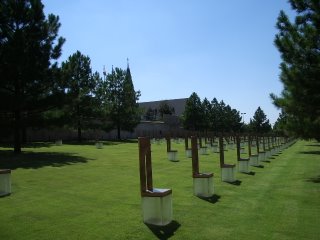This is the third and final installment of what spiritual abuse is. It is written by Dr. Morris Chapman about a book written on this subject. Following are the four remaining characteristics of spiritual abuse.
-----------------------------------------------------------
The first three characteristics of a spiritually abusive system were addressed in a previous blog. They are Power-Posturing, Performance Preoccupation, and Unspoken Rules. As in previous posts, I am quoting extensively from the authors of the book, The Subtle Power of Spiritual Abuse.
4. Lack of Balance
The fourth characteristic of a spiritually abusive system is an unbalanced approach to living out the truth of the Christian life. This shows itself in two extremes: extreme objectivism and extreme subjectivism.
Extreme Objectivism
The first extreme is an empirical approach to life that elevates objective truth to the exclusion of valid subjective experience. Even though the Holy Spirit’s work might be acknowledged theologically, on a practical level it would be suspect, or denied.
This approach to spirituality creates a spiritual system in which authority is based upon the level of education and intellectual capacity alone, rather than on intimacy with God, obedience and sensitivity to His Spirit. The New Testament says, “Now as [the religious leaders] observed the confidence of Peter and John, and understood that they were uneducated and untrained men, they were marveling, and began to recognize them as having been with Jesus” (Acts 4:13). Peter and John’s confidence and authority come from the fact that they had been with Jesus, and they were “filled with the Holy Spirit” (Acts 4:8).
Extreme Subjectivism
The other manifestation in the lack of balance is seen in an extremely subjective approach to the Christian life. What is true is decided on the basis of feelings and experiences, giving more weight to them than to what the Bible declares.
As with the extreme objective approach, Christians who are highly subjective also have a view of education – most often, that education is bad or unnecessary. There is almost a pride in not being educated, and a disdain for those who are. We must remember that Paul wrote to Timothy, “Be diligent to present yourself approved to God as a workman who does not need to be ashamed, handling accurately the word of truth” (2 Timothy 2:15 NASB).
It is important to study the Word of God. And it is good, not bad, to acquire mental tools to handle God’s Word accurately. The guidance of the Holy Spirit in our lives will never contradict the Word of God, therefore any “impression” God’s Spirit makes upon our minds and hearts will be in accord with God’s written Word.
Three reasons it is difficult to leave a spiritually abusive system--
The authors state, “People within spiritually abusive systems are wounded and tired. The first four characteristics of spiritual abuse explain why. Now we would like to examine why many find it difficult or impossible to leave, even after the abuse is recognized.”
Because of the focus on performance, things about a spiritual abusive situation may look good to those who have yet to follow a spiritually abusive leader. A system that concentrates upon spiritual abuse acts like a “spiritual magnet” pulling in people who are drawn by several factors, including the potential to join a ‘righteous cause,’ be on the winning side, and/or become the recipients of rewards for being submissive and obedient. However, the system acts like a black hole with spiritual gravity so strong it is very hard for people to get out.
Even information about what is going on within the system can’t get out. If you tell others your growing concerns about the control factors in place, you are then treated as if you are the problem. The following three characteristics of spiritual abuse have been identified by the authors as making spiritual systems difficult to escape.
5. Paranoia
Johnson and Van Vonderen state that “In the spiritual abusive situation, there is a sense, spoken or unspoken, that ‘others will not understand what we’re all about, so let’s not let them know—that way they won’t be able to ridicule or persecute us.’” A silent spirit of paranoia is developed in the situation wherein people are being abused spiritually. Such a mentality builds a strong wall or bunker around the abusive system, isolates the abusers from scrutiny and accountability and makes it more difficult for people to leave. People are misled into thinking the only safety is in the system. Ironically, Jesus and Paul both warned that one of the worst dangers to the flock was from wolves in the house (Matthew 10:16; Acts 20:29-30).
In the utilization of spiritual abuse it is not uncommon for the abuser to focus on, even create, an external enemy in the minds of the abused in order to keep from answering legitimate questions.
6. Misplaced Loyalty
The next characteristic of spiritually abusive systems is that a misplaced sense of loyalty is fostered and even demanded. We’re not talking about loyalty to Christ, but about loyalty to a given organization, church, group, or leader. Because authority is assumed or legislated (and therefore not real) following must be legislated as well. A common way this is accomplished is by setting up a system where disloyalty to or disagreement with the leadership is construed as the same thing as disobeying God.
There are three factors that come into play, leading to a charge of misplaced loyalty, (1) leadership projects a “we alone are right” mentality, (2) leadership uses “scare tactics” to intimidate and/or threaten, and (3) leadership threatens humiliation.
“We Alone are Right”
Those who have given their allegiance to the leaders(s) must remain in the system if they want to be “safe,” and not be viewed as wrong or “backslidden.” The authors counsel that “you need to be in a situation where you can open up your heart and receive what God has to give you.”
Scare Tactics
The authors illustrate what they mean by scare tactics. They state that “not long ago a Christian man made it clear to us that he had separated himself from the world by not fellowshipping with ‘the infidels.’ As we talked, we learned that his definition of ‘infidel’ was not limited to non-Christians. It also included Christians from other denominations, certain Christians from his own denomination, and even Christians from his own church who didn’t think as he did. In fact, we were dismayed to learn that we were also considered ‘infidels’ because we failed to agree with him.” Scare tactics are used in a spiritually abusive setting as spiritual blackmail.
Humiliation
The third method leading to the charge of misplaced loyalty is the threat of humiliation. This is done by publicly shaming, exposing, or threatening to remove people from the group. The authors go on to say, “Unquestionably, there is a place for appropriate church discipline, but in the abusive system, it is the fear of being exposed, humiliated, or removed that insures your proper allegiance and insulate those in authority. You can be “exposed” for asking too many questions, for disobeying the unspoken rules, or for disagreeing with authority.
People are made public examples in order to send a message to those who remain. Others have phone campaigns launched against them to warn their friends and others in the group about how “dangerous” they are.
7. Secretive
Authors Johnson and Van Vonderen state that “when you see people in a religious system being secretive—watch out. People don’t hide what is appropriate; they hide what is inappropriate.” One reason spiritually abusive people are so secret is because they are so image conscious. They can’t live up to their own performance standards, so they have to hide what is real.
The leader’s “condescending, negative view of the laity” is another reason for secrecy. They tell themselves, ‘People are not mature enough to handle truth.’ This is patronizing, at best.
Defensive conspiracies too often develop among the ones being abused. Since it is not alright to talk about problems, people form conspiracies behind closed doors and over the telephone as they try to solve things informally, but nothing gets solved. All the while, building God’s true Kingdom is put on hold.
Conclusion
When these seven characteristics exist in a denomination, church, group, or family, the result will be spiritual abuse. It will be a closed system with rigid boundaries that prevent people from leaving.
The authors conclude the naming of the seven characteristics with the following observation. “We believe one answer lies in the abusive system’s use – or misuse – of Scripture.” They open the following chapter with these words, “Used rightly, the Word of God is a sword, exposing motives of the heart, and a lamp lighting the way for those who follow God.
Misused, it can become nothing more than a club in the hands of those who equate pretending with obedience and silence with peace. If you care to read more, I give you the information needed to order the book from your Christian bookstore. The title of the book is The Subtle Power of Spiritual Abuse by David Johnson and Jeff Van Vonderen, and published by Bethany House (1991). What I have written draws extensively from the authors themselves and gives you the source for further study. As I have previously stated, I do not agree with every supposition made by the authors. Nevertheless, spiritual abuse is a little known subject, and merits study and better understanding.








